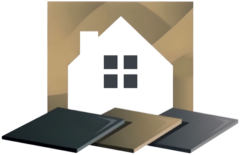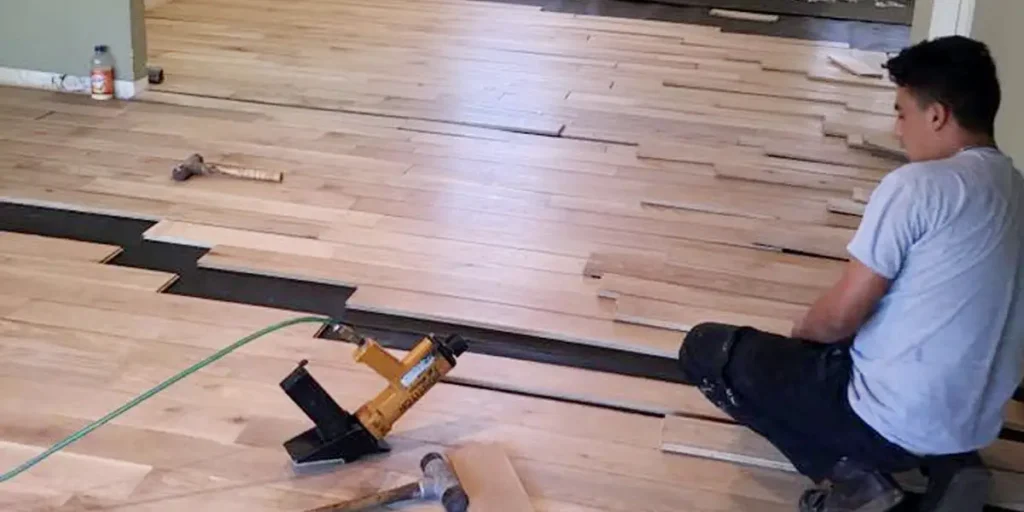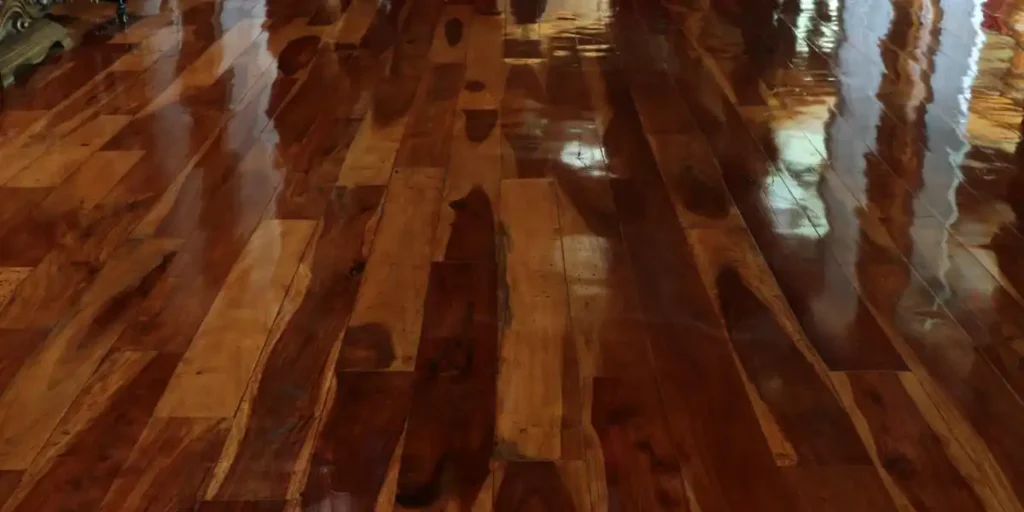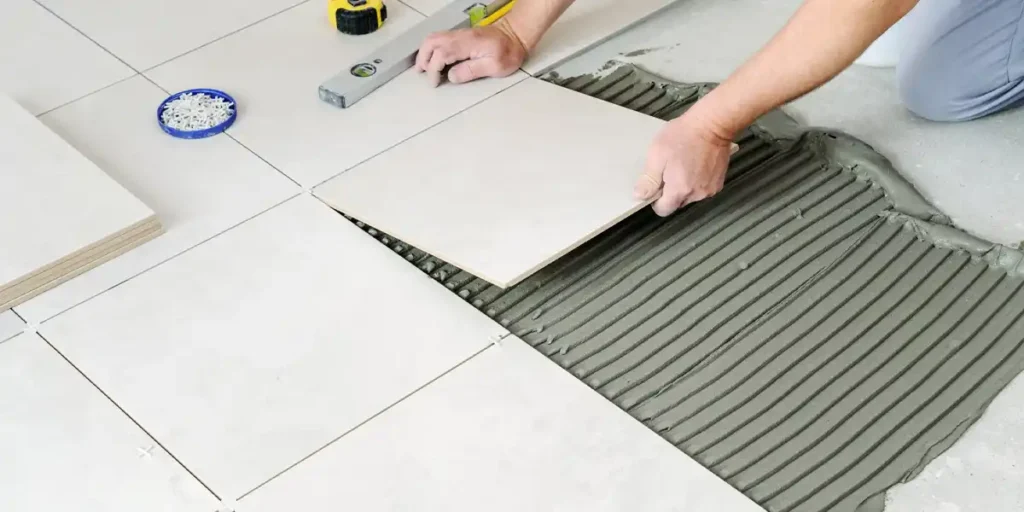Hardwood flooring is undeniably beautiful, adding warmth and elegance to any space. But the question, “Is hardwood flooring waterproof?” often sparks concern among homeowners.
While hardwood offers aesthetic appeal and long-term value, the fear of water damage can overshadow its advantages.
This guide aims to clarify the waterproofing capabilities of hardwood flooring, debunk myths, and provide practical tips to protect your floors from water-related issues.
The Persistent Myth: Hardwood and Water Are Best Kept Apart
For decades, conventional wisdom dictated that hardwood and water are incompatible. While it’s true that traditional solid hardwood is sensitive to moisture, advancements in flooring technology have made water-resistant options a viable choice.
The idea that all hardwood floors are unsuitable for areas prone to spills or humidity is an oversimplification. By understanding the nuances of different types of hardwood, you can make an informed decision that balances beauty with practicality.
Understanding the Types of Hardwood Flooring
Not all hardwood floors are created equal. To determine whether hardwood flooring is suitable for your home, it’s crucial to understand the differences between solid and engineered hardwood.
Solid Hardwood
Solid hardwood consists of a single piece of natural wood, offering timeless beauty and durability. However, its porous nature makes it susceptible to water damage. Spills that aren’t promptly cleaned can lead to warping, cupping, or even mold growth. While refinishing can restore its appearance, prolonged exposure to moisture can compromise its structural integrity.
Engineered Hardwood
Engineered hardwood is constructed with a real wood veneer atop a core of plywood or high-density fiberboard (HDF). This layered design provides better dimensional stability and resistance to moisture than solid hardwood. While not completely waterproof, engineered hardwood with a high-quality finish can withstand minor spills and humidity better, making it a popular choice for kitchens and entryways.
The Role of Finishes and Sealants
The finish on hardwood flooring acts as a protective barrier against moisture. A polyurethane finish, for example, can repel spills and reduce the risk of water damage.
However, no finish is entirely waterproof. Over time, normal wear and tear can diminish the effectiveness of the sealant, leaving the wood vulnerable. Regular maintenance, such as refinishing and resealing, is essential to preserve the floor’s water-resistant properties.
Waterproof vs. Water-Resistant Hardwood Flooring: What’s the Difference?
Many flooring options marketed as “waterproof” are engineered products designed with enhanced resistance to moisture. While these floors can withstand brief exposure to spills or minor flooding, they are not impervious to long-term exposure to water.
On the other hand, traditional solid hardwood is considered water-resistant at best. Understanding this distinction helps set realistic expectations and ensures proper care.
Solutions That Work: Protecting Your Hardwood Investment
Whether you choose solid or engineered hardwood, proactive measures can significantly reduce the risk of water damage.
- Choose Engineered Hardwood: Opt for options with advanced waterproof coatings, especially for moisture-prone areas like kitchens or basements.
- Clean Spills Immediately: Wipe up liquids as soon as they occur to prevent seepage.
- Use Area Rugs: Place rugs in high-traffic zones and near sinks or entryways to minimize exposure.
- Maintain the Finish: Regular refinishing protects the surface and enhances water resistance.
- Control Humidity Levels: Use a dehumidifier to maintain optimal indoor humidity, especially during humid seasons
In Closing
The question, “Is hardwood flooring waterproof?” requires a nuanced answer. While no hardwood floor is completely waterproof, engineered options with advanced finishes offer excellent water resistance.
By selecting the right flooring type, using protective measures, and committing to regular maintenance, you can enjoy the timeless elegance of hardwood without undue concern over water damage.
Remember, understanding your flooring and its limitations is the key to protecting your investment for years to come.
Don’t settle for less. Trust Cardenas Flooring for premium hardwood floor services that enhance your space. Contact us now to get started!
FAQs
Can hardwood flooring handle occasional spills?
Hardwood floors can handle occasional spills if cleaned promptly. Solid hardwood is less resistant to water and requires immediate attention to prevent damage like warping or staining. Engineered hardwood, especially with a water-resistant finish, offers better protection against spills but isn’t completely waterproof. The key is to act fast—wipe up any liquid immediately to reduce the risk of moisture seeping into the wood. Over time, maintaining the finish is essential to ensure ongoing protection against minor water exposure.
Is waterproof hardwood flooring truly waterproof?
While marketed as “waterproof,” most hardwood floors are actually water-resistant. Engineered hardwood with advanced waterproof finishes can withstand spills and humidity better than solid hardwood, but standing water or prolonged exposure will still cause damage. For areas prone to excessive moisture, such as bathrooms or basements, it’s best to explore alternative flooring options, like vinyl or tile, for true waterproofing. Keep in mind that proper care and immediate spill cleanup are still necessary, even with waterproof hardwood.
What should I do if water gets under my hardwood floors?
If water seeps beneath your hardwood floors, address it immediately to prevent long-term damage. Use a wet/dry vacuum to remove as much water as possible and place fans and dehumidifiers to dry the area thoroughly. If you notice warping, mold growth, or a musty smell, consult a flooring specialist. In severe cases, sections of the flooring may need to be removed, dried, or replaced. Prolonged moisture can compromise the subfloor as well, so timely action is critical.
Are there any hardwood options suitable for kitchens and bathrooms?
Engineered hardwood with a high-quality water-resistant finish is a better option for kitchens and bathrooms than solid hardwood. These floors are designed to handle higher levels of humidity and occasional spills. However, you’ll need to take precautions like using rugs, sealing joints, and cleaning up water promptly. For bathrooms, consider pairing engineered hardwood with additional waterproofing measures, like silicone sealants around edges, to prevent seepage into the subfloor.
How can I protect hardwood floors from water damage?
To protect hardwood floors from water damage, start by cleaning spills immediately and using rugs or mats in high-traffic or moisture-prone areas, such as entryways and sinks. Maintain a stable indoor humidity level (between 30-50%) with dehumidifiers if necessary. Regularly inspect and refinish the floor to ensure the protective coating remains intact. For areas with high moisture risk, consider waterproof engineered hardwood or water-resistant alternatives. Proactive care and maintenance are essential to preserving your floors’ beauty and longevity.




